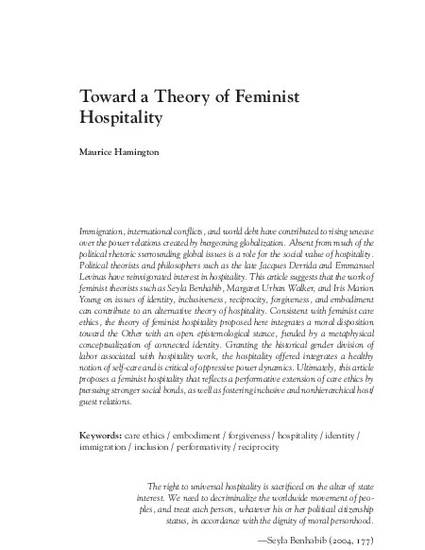
- Ethics,
- Hospitality -- Philosophy,
- Feminist ethics -- United States
Immigration, international conflicts, and world debt have contributed to rising unease over the power relations created by burgeoning globalization. Absent from much of the political rhetoric surrounding global issues is a role for the social value of hospitality. Political theorists and philosophers such as the late Jacques Derrida and Emmanuel Levinas have reinvigorated interest in hospitality. This article suggests that the work of feminist theorists such as Seyla Benhabib, Margaret Urban Walker, and Iris Marion Young on issues of identity, inclusiveness, reciprocity, forgiveness, and embodiment can contribute to an alternative theory of hospitality. Consistent with feminist care ethics, the theory of feminist hospitality proposed here integrates a moral disposition toward the Other with an open epistemological stance, funded by a metaphysical conceptualization of connected identity. Granting the historical gender division of labor associated with hospitality work, the hospitality offered integrates a healthy notion of self-care and is critical of oppressive power dynamics. Ultimately, this article proposes a feminist hospitality that reflects a performative extension of care ethics by pursuing stronger social bonds, as well as fostering inclusive and nonhierarchical host/guest relations.

This is the publisher's final PDF. Copyright (2010) John Hopkins University Press. Version of record can be found at http://dx.doi,org/ 10.1353/nwsa.0.011
*At the time of publication, Maurice Hamington was affiliated with Metropolitan State University of Denver